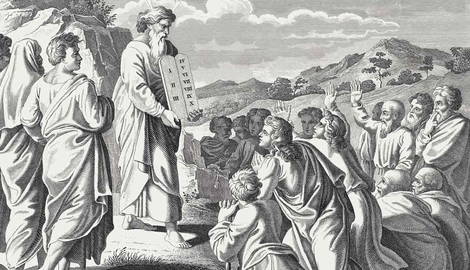
On the question of whether Christians are still required to follow the Old Testament Law, there is no consensus answer. In general, Christians will likely answer, “No, we are no longer under the Law. We are under grace.” The biblical answer, however, is not that simple. On some laws, there is consensus, but on others, opinions differ. To understand why, it is essential to recognize that there are distinct categories of law. Once there is clarity on the categories, it will be easier to understand the perspectives of different Christian groups on its applicability today.
Old Testament Law

Old Testament Law is not monolithic. Scholars have identified three types of law in the Old Testament, each with its own purpose, audience, and applicability. These three kinds of law are Moral Law, Ceremonial Law, and Civil Law.
The Moral Law refers to laws that express God’s character and reveal the standard for conduct for those who follow him. These laws are rooted in eternal principles and establish an objective standard of right and wrong, which serve as a guide for those who are righteous and desire to live just lives. As eternal principles, these laws apply universally to all people and are timeless. The New Testament often reaffirms these laws.
The Ten Commandments, detailed in Exodus 20:1-17 and Deuteronomy 5:6-21, are examples of the Moral Law. Many Christians divide the Ten Commandments into two parts. The first four commandments address the relationship between man and God, and the last six deal with the relationships between people. There is, however, a good argument that the fourth commandment addresses human-divine and inter-human relationships.
The Ceremonial Law governed religious life, rituals, and worship in Israel. They primarily deal with sacrifices, temple worship, cleanliness, and priestly duties. Many of these ceremonies and offices were types that prefigured the ministry of Christ. As such, they were highly symbolic and specific to the covenant between God and Israel. These ceremonial laws set Israel apart from the pagan nations around them. Deuteronomy 26:18 highlights their uniqueness: “And Jehovah has taken you today to be His peculiar people, as He has promised you, and to keep all His commandments.” Most scholars agree that the commandments in this verse are not limited to the ceremonial laws.

These laws detailed the rites and rituals of the sacrificial system, the Day of Atonement, the annual feasts, and clean and unclean foods. Most Christians believe these laws pertained to Israel only, and since they were fulfilled in the ministry and death of Christ, they are no longer binding.
Civil Law dealt with judicial and social affairs of the theocracy and later monarchy in Israel. These laws contained practical instructions for justice, economics, leadership, and interpersonal relationships. These laws addressed the historical and cultural context of ancient Israel, ensuring fairness, restitution, and order in society. Violation of these laws resulted in various penalties depending on the severity of the offense.
Civil Law determined restitution for loss, established cities of refuge, set Sabbath and Jubilee years to prevent perpetual poverty, and provided guidelines for those who ruled in Israel. These laws were specific to Israel, but Christians often derive principles of justice, compassion, and social responsibility from them.
Theological Perspectives on the Law

Different theological perspectives have developed on the applicability of the Old Testament Law to Christians during the Church era. Awareness of these perspectives will help answer the question at the core of this discussion.
The Law was Fulfilled in Christ
Many Christians from the Protestant and, particularly, the Evangelical tradition, believe Christ has fulfilled the Law by perfectly obeying it. In their understanding, Christ accomplished the ultimate purpose of the law by atoning for the sins of humanity through his death and resurrection. To them, Christians are no longer obliged to keep the Law of Moses because they are under the Law of Christ, which emphasizes love, grace, and the guidance of the Holy Spirit. Some Christians with this conviction claim to comply with the requirements of the Ten Commandments not because it is law but because the Holy Spirit presses those principles on their hearts. How that differs from keeping the Law is unclear. They hold that the principles of the Moral Law remain valid, but the Ceremonial and Civil Law were intended for Israel only.
The Enduring Moral Law
In Reformed theology, scholars believe the Moral Law reflects God’s eternal character and is, therefore, relevant and binding on all believers of all ages. They consider the Civil and Ceremonial Law as no longer in force because it was meant for Israel only. The Westminster Confession of Faith (1646), for example, declares that the Ceremonial and Civil Law were abrogated while the Moral Law continued to guide Christian ethics. According to this perspective, obedience to the Moral Law is not a means of salvation but a response to God’s grace.

Extremes
Other perspectives range from legalism, which insists on strict obedience to the Moral Law to achieve salvation, to antinomianism, which rejects the Law in its entirety, claiming Christians are free from any moral constraints. Most Christian traditions reject these extremes and subscribe to some form of moral guidance derived from the Old Testament Moral Law while rejecting the obligation to observe the Ceremonial Law that Christ fulfilled and the Civil Law that governed society in Israel.
In recent scholarship, the tendency has been to move away from the antinomian position in light of the positive reflections many New Testament passages have on the Law. One such example is Romans 12:7: “So the law is holy, and the commandment is holy and righteous and good.” With such a positive reflection on the Law, it is untenable to regard the Law as valueless in the Christian era.
Conflicting Approaches
Covenant Theology recognizes a continuation of covenants between the Old and New Testaments, which results in greater regard for the Moral Law. Dispensational theology, in contrast, encourages a strong distinction between Israel and the Church. This perspective sees the Old Testament Law as primarily for Israel and largely irrelevant for Christians under the “dispensation of grace.” The relevance of the Moral Law is influenced by the framework the reader uses to interpret the Bible.
Questionable Categories

The three categories of laws that scholars generally recognize raise some significant questions that remain unaddressed. Scholars tend to include laws on clean and unclean meat among the Ceremonial Laws, though these laws were universal and not applicable only to Israel. Though never detailed before Leviticus 11, knowledge about what was clean and unclean predated Israel by centuries, since Noah had to distinguish between clean and unclean animals when determining how many animals to allow into the ark (Genesis 7:2-3).
Most scholars agree that the Ten Commandments constitute moral imperatives. However, that would imply that Sabbath observance is a moral matter, and its abrogation or change would constitute an immoral act. Most scholars, however, postulate that Sabbath observance was only applicable to Israel. That means that they consider it either as a ceremonial matter, like the annual feasts, or a Civil Law, which would also render it irrelevant to contemporary Christianity.
In Catholicism, the Decalogue is not the same as the Biblical versions, meaning the moral norms God has established were modified by Papal authority. There are, however, no scholars who question the legitimacy of the Sabbath commandment as part of the biblical Decalogue, which is a moral code that many Christian denominations regard as an otherwise enduring principle.
These two examples show that categories of law are not consistently delineated or applied. The influence of tradition on the application of laws within categories is undeniable. Many Christians include or exclude these laws based on what they have been exposed to, rather than considering the principles that determine their categories.
Applicability of the Old Testament Law to Christians

Whether Christians should follow the Old Testament Law is not a simple “yes” or “no” question. It requires careful consideration of which laws should apply. Answering “no” would condone killing, stealing, coveting, etc. Answering “yes” would require the sacrificial system to be implemented again.
Scholars agree that the ceremonial systems, with their types, met their antitype in the ministry, death, and resurrection of Christ. Colossians 2:16-17 show that ceremonial festivals and annual Sabbaths, and thus the Ceremonial Laws, are no longer a requirement for New Testament believers.
The Civil Law of the Old Testament regulated Israelite society during its theocratic and monarchic dispensations. These laws cannot be a requirement for Christians who live under various governmental systems globally. Christianity is not limited to a single nation or government, rendering the Old Testament Civil Law obsolete in the Christian context.
In the Sermon on the Mount, Jesus demonstrated a stricter application of the Ten Commandments than the letter of that law requires. Matthew 5:17-19 reveals the timeless relevance of the Moral Law, making it relevant to the Christian era, though its observance never had salvific value in any epoch.
The categorization of the laws regulating clean and unclean is problematic. Clean and unclean food does not have typological or symbolic value and therefore could not be fulfilled by Christ in the way that he fulfilled the ceremonial system. Since it also does not fit within the Moral or Civil Laws, they may justify a separate category of Health Laws. These laws cannot be confined to the time of Israel since they were in effect long before the origin of Israel.










